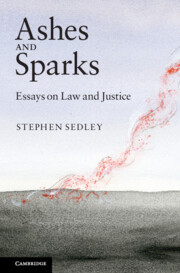Book contents
- Frontmatter
- Contents
- Preface
- Acknowledgements
- PART I History
- PART II Law
- PART III Justice
- 24 The right to know
- 25 The moral economy of judicial review
- 26 Policy and law
- 27 Responsibility and the law
- 28 The Crown in its own courts
- 29 Human rights – who needs them?
- 30 Fundamental values – but which?
- 31 Overcoming pragmatism
- 32 Sex, libels and video-surveillance
- 33 This beats me
- 34 Public inquiries: a cure or a disease?
- 35 Human rights: a twenty-first century agenda
- 36 Are human rights universal, and does it matter?
- 37 Bringing rights home: time to start a family?
- 38 The four wise monkeys visit the marketplace of ideas
- Index
30 - Fundamental values – but which?
Published online by Cambridge University Press: 05 June 2012
- Frontmatter
- Contents
- Preface
- Acknowledgements
- PART I History
- PART II Law
- PART III Justice
- 24 The right to know
- 25 The moral economy of judicial review
- 26 Policy and law
- 27 Responsibility and the law
- 28 The Crown in its own courts
- 29 Human rights – who needs them?
- 30 Fundamental values – but which?
- 31 Overcoming pragmatism
- 32 Sex, libels and video-surveillance
- 33 This beats me
- 34 Public inquiries: a cure or a disease?
- 35 Human rights: a twenty-first century agenda
- 36 Are human rights universal, and does it matter?
- 37 Bringing rights home: time to start a family?
- 38 The four wise monkeys visit the marketplace of ideas
- Index
Summary
Legal ethics are taught as part of every Bar qualification course in the United States. In Britain there is a single university chair (at Exeter) in the subject. This was a review, published in 2001 in the London Review of Books, of Fundamental Values, a volume by several hands, edited by the then holder of the chair, Kim Economides.
About ten years ago bans were imposed by two French municipalities on local funfairs where, for a few francs, revellers had been permitted to shoot a dwarf from a cannon. The official reason was the maintenance of public order, but the regional courts which initially overturned the bans pointed out that the shows were entirely orderly. The real issue was human dignity; but the people whose dignity was being compromised were the dwarfs who made their living from the spectacle and were among the chief opponents of the ban. The Conseil d'Etat, the final appeal court, restored the prohibitions, deciding that public order included public morals and that these were violated by assaults on human dignity even in cases where the victim was willing.
Once, before the onset of middle-class morality, the English courts had taken a similar line to the French regional courts. Chief Justice Holt, the first great judge of the Bill of Rights era, throwing out the indictment against a bookseller named Read for publishing a dirty book called The 15 Plagues of a Maidenhead, said: ‘This is for printing bawdy stuff that reflects on no person … If there is no remedy in the spiritual court, it does not follow there must be a remedy here […]’
Information
- Type
- Chapter
- Information
- Ashes and SparksEssays On Law and Justice, pp. 295 - 301Publisher: Cambridge University PressPrint publication year: 2011
Accessibility standard: Unknown
- 1
- Cited by
